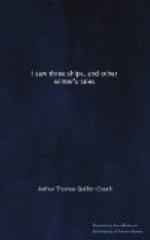Zeb snatched the glass.
“‘Pon the riggin’, Zeb, just under her lee! I saw en move— a black-headed chap, in a red shirt—”
“Right, Farmer—he’s clingin’, too, not lashed.” Zeb gave a long look. “Darned if I won’t!” he said. “Cast over them corks, Sim Udy! How much rope have ’ee got, Jim?” He began to strip as he spoke.
“Lashins,” answered Jim Lewarne.
“Splice it up, then, an’ hitch a dozen corks along it.”
“Zeb, Zeb!” cried his father, “What be ’bout?”
“Swimmin’,” answered Zeb, who by this time had unlaced his boots.
“The notion! Look here, friends—take a look at the bufflehead! Not three months back his mother’s brother goes dead an’ leaves en a legacy, ’pon which, he sets up as jowter—han’some painted cart, tidy little mare, an’ all complete, besides a bravish sum laid by. A man of substance, sirs—a life o’ much price, as you may say. Aw, Zeb, my son, ’tis hard to lose ’ee, but ’tis harder still now you’re in such a very fair way o’ business!”
“Hold thy clack, father, an’ tie thicky knot, so’s it won’t slip.”
“Shan’t. I’ve a-took boundless pains wi’ thee, my son, from thy birth up: hours I’ve a-spent curin’ thy propensities wi’ the strap—ay, hours. D’ee think I raised ’ee up so carefully to chuck thyself away ’pon a come-by-chance furriner? No, I didn’; an’ I’ll see thee jiggered afore I ties ’ee up. Pa’son Babbage—”
“Ye dundering old shammick!” broke in the parson, driving the ferule of his cane deep in the sand, “be content to have begotten a fool, and thank heaven and his mother he’s a gamey fool.”
“Thank’ee, Pa’son,” said Young Zeb, turning his head as Jim Lewarne fastened the belt of corks under his armpits. “Now the line—not too tight round the waist, an’ pay out steady. You, Jim, look to this. R-r-r—mortal cold water, friends!” He stood for a moment, clenching his teeth—a fine figure of a youth for all to see. Then, shouting for plenty of line, he ran twenty yards down the beach and leapt in on the top of a tumbling breaker.
“When a man’s old,” muttered the parson, half to himself, “he may yet thank God for what he sees, sometimes. Hey, Farmer! I wish I was a married man and had a girl good enough for that naked young hero.”
“Ruby an’ he’ll make a han’some pair.”
“Ay, I dare say: only I wasn’t thinking o’ her. How’s the fellow out yonder?”
The man on the wreck was still clinging, drenched twice or thrice in the half-minute and hidden from sight, but always emerging. He sat astride of the dangling foremast, and had wound tightly round his wrist the end of a rope that hung over the bows. If the rope gave, or the mast worked clear of the tangle that held it and floated off, he was a dead man. He hardly fought at all, and though they shouted at the top of their lungs, seemed to take no notice—only moved feebly, once or twice, to get a firmer seat.




